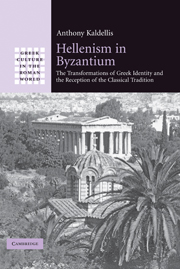 Hellenism in Byzantium
Hellenism in Byzantium Book contents
- Frontmatter
- Contents
- Preface
- Introduction
- PART I GREEKS, ROMANS, AND CHRISTIANS IN LATE ANTIQUITY
- 1 “We too are Greeks!”: the legacies of Hellenism
- 2 “The world a city”: Romans of the East
- 3 “Nibbling on Greek learning”: the Christian predicament
- Interlude: Hellenism in limbo: the middle years (400–1040)
- PART II HELLENIC REVIVALS IN BYZANTIUM
- General conclusions
- Bibliography
- Index
1 - “We too are Greeks!”: the legacies of Hellenism
Published online by Cambridge University Press: 24 December 2009
- Frontmatter
- Contents
- Preface
- Introduction
- PART I GREEKS, ROMANS, AND CHRISTIANS IN LATE ANTIQUITY
- 1 “We too are Greeks!”: the legacies of Hellenism
- 2 “The world a city”: Romans of the East
- 3 “Nibbling on Greek learning”: the Christian predicament
- Interlude: Hellenism in limbo: the middle years (400–1040)
- PART II HELLENIC REVIVALS IN BYZANTIUM
- General conclusions
- Bibliography
- Index
Summary
People speaking the language we call Greek have lived continually in the Aegean region since at least 1600 BC, and possibly earlier. Greek is, moreover, one of the most conservative and enduring languages in history. Among those still spoken it has probably changed the least in the past three and a half thousand years, by any indicator. This is an astonishing feat of continuity and provides an obvious and fair point of national pride. But historians should be cautious of arguments for national continuity whose main foundation is language. Granted, there have been Greek-speakers in the mainland since the age of the Mycenaean palaces, but they have not always regarded themselves as Greeks – as Hellenes. On the basis of Hittite evidence and Homer, it now seems certain that the Mycenaeans called themselves Achaians, a term arising from historical circumstances and encoding values that we cannot now recover. The ethnonym Hellenes did not emerge until much later, roughly at the time of Homer in the eighth century BC, as even ancient historians such as Thucydides realized. Greek identity is a historical and social construct: it arose at a particular moment in history in accordance with a particular set of social and ideological coordinates; it then changed and evolved, as all human things do; and then went into abeyance for about a thousand years, the period that will be covered in this study.
- Type
- Chapter
- Information
- Hellenism in ByzantiumThe Transformations of Greek Identity and the Reception of the Classical Tradition, pp. 13 - 41Publisher: Cambridge University PressPrint publication year: 2008
